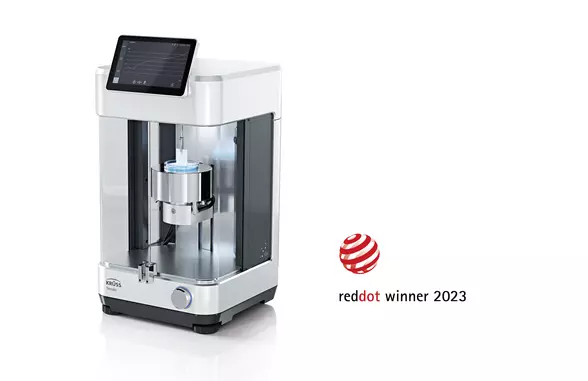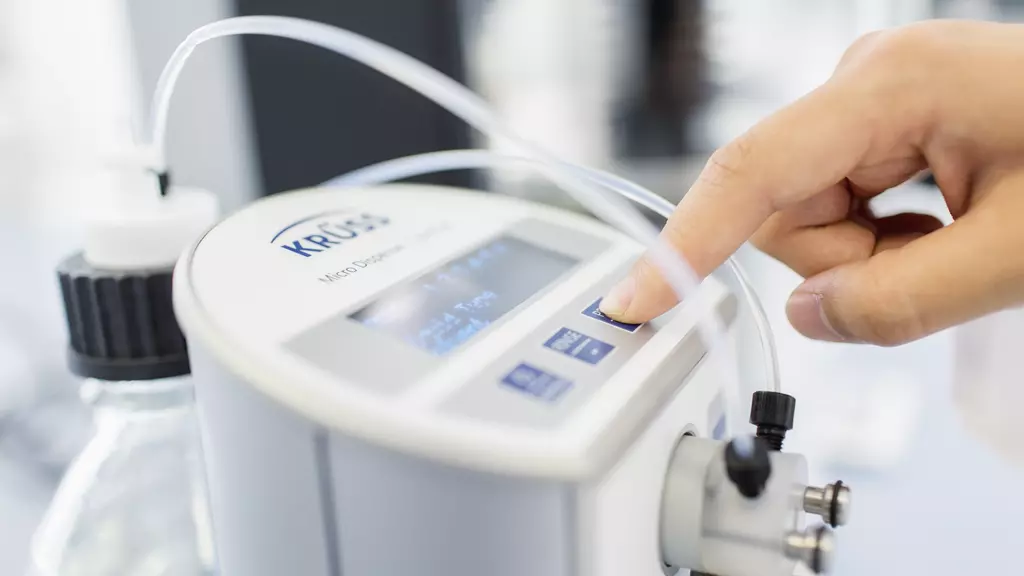Surface quality control has never been so easy and reliable

Surface tension and interfacial tension measurement for wetting and cleaning agents, emulsifiers, or other surfactants
Determination of the effectiveness and efficiency of surfactants by CMC measurement
Wetting behavior of tablets, pharmaceutical active ingredients, and excipients
Wetting of varnishes and paints
Wetting and adhesion of coatings
Development of cosmetic products
Wetting properties of inks
Wetting of fiber bundles and textiles, also for fiber-reinforced polymers
Sedimentation and ductility of dispersions
Analyzing surface modifications
Adhesion at superhydrophobic surfaces
Surface tension using the tensile force of a lamella underneath a ring
Interfacial tension using the tensile force of a lamella underneath a ring
Surface tension using the tensile force of a lamella which is stretched until it disrupts
Interfacial tension using the tensile force of a lamella which is stretched until it disrupts
Automated determination of the critical micelle concentration by measuring the SFT at different concentrations
Surface tension using the wetting force of a liquid at a platinum plate or rod
Interfacial tension using the wetting force of a liquid at a platinum plate or rod
Contact angle using the wetting force of a liquid at a solid sample
Contact angle between a liquid and porous material using the capillary force
Surface free energy of a solid using contact angle data
Calculating adhesion-related scientific parameters for the interfacial contact
Density determination of a liquid using the buoyancy of a probe immersed in the sample
Density determination of a solid using the buoyancy of the sample immersed in a liquid
Sedimentation speed of a dispersion
Penetration resistance of a sediment against a probe
Using a force sensor and a software-controlled sample stage for freely defined procedures
Carrying out a measurement up to 20 consecutive times and displaying the results together
Calculating the polar and disperse part of the surface tension from contact angle and surface tension data
Using force measurement and image analysis to determine the adhesion behavior of a drop brought in contact with and then pulled off a solid surface
Surface tension of a liquid
Interfacial tension between two liquids
Critical micelle concentration (CMC) of a surfactant and calculation of excess concentration and surface area per molecule
Advancing and receding contact angle of a solid body
Surface free energy of a solid
Work of adhesion, interfacial tension, and spreading coefficient between a solid and a liquid
Contact angle of a powder
Density of a liquid
Density of a solid
Sedimentation speed of a dispersion
Penetration resistance of a sediment
Sample temperature

Make the best use of your instrument with our all-around service including application advice and a fast lane to our technical support. Never worry about repairs, downtimes, missing new functions – not even about damages you may inflict! Available in almost all European countries.
To save time before and during each measurement, the sample stage of Tensíío moves particularly fast while preventing premature sample contact using pre-programmed standard positions. Or it moves extremely slow with hardly any vibration if you need it to, for example when analyzing high-viscosity liquids. Measurement preparation is easy thanks to the spacious, perfectly accessible sample chamber and the built-in stirrer and temperature control. The large, integrated touch display simplifies operation and obviates any external control pad, thus sparing lab space. Speaking of which, no external thermostat or controller is required when we equip your Tensíío with integrated temperature control up to 300 °C.
Tensíío comes with 15 different approaches of analyzing surface and interfacial tension, wettability, and many other properties of your liquid samples or your solid bodies, powders, or fibers. Each one is carried out automatically using prepared and adaptable programs in the ADVANCE software. Further methods, which can be added anytime later, are being developed as you read this.
Even more is possible when the optional high-resolution camera records what happens at the contact area at the liquid surface. Measure the adhesion between a drop and a solid surface while analyzing the drop optically – or even create your very own method using the flexible and intuitive automation programming in ADVANCE as a toolbox.
Sample chamber illumination for easier preparation may be familiar to you. What is surely new is a tensiometer signaling whether the measuring result lies within a certain limit using green or red light. This is just one of the many ways to incorporate tri-color illumination into your automated measurement sequence.
Yes, there is this top-class, high-resolution force sensor. And there is the most accurate height detection for the sample stage and a large selection of methods. But maybe you only have one specific task that just requires moderate force precision within certain specifications. Or you may not want to analyze wettability, so there is no use of a height sensor. To make Tensíío the right solution for you – and the one adapted to your budget – there are countless options to customize the instrument. And it is always possible to upgrade Tensíío subsequently if your tasks grow. Just tell us what you need!
When a product makes you say: “They thought of everything!”, then users have been closely listened to, or, as with Tensíío, were even involved in the development. Tensíío has all the small details that add up to maximum convenience. Take the bottom plate of the sample chamber, which can be easily removed for cleaning, for example. Or the electronic levelling assistant, which helps you set up the instrument properly. Or the removable side doors for comfortable access to the sample chamber. You can even equip Tensíío with an ionizer to automatically dispose of electric charges that otherwise often interfere with analyses of solid samples. All in all, we have taken care that working with Tensíío comes with a highly positive user experience.

Our specially developed Micro Dispensers equip Tensíío for measuring the critical micelle concentration (CMC) with the utmost precision. The surfactant concentration range is set up and then measured fully automatically.